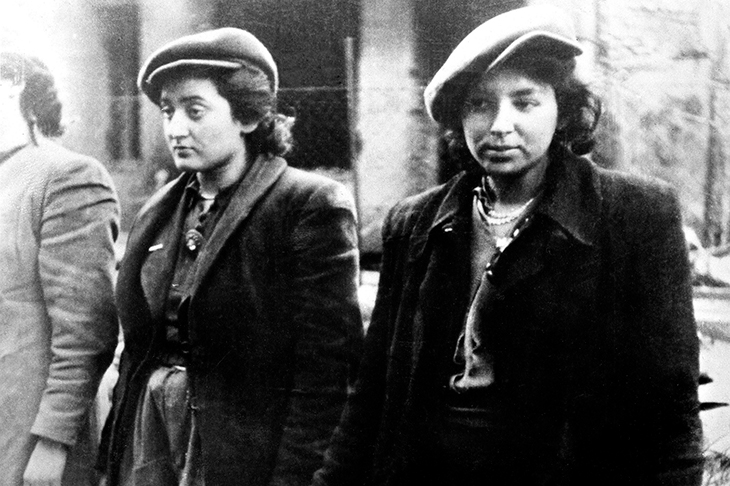‘Jewish Resistance in Poland: Women Trample Nazi Soldiers,’ ran a New York headline in late 1942. That autumn, the Nazi occupying forces in the ancient town of Lubliniec, in southern Poland, had forced the Jewish community to assemble in the square. As men, women, the elderly and children were ordered to strip, a dozen women suddenly attacked their persecutors, scratching, biting and hurling stones. Stunned by this unexpected defiance, the Nazi soldiers fled. The influence of such courageous acts of resistance was tremendous. Galvanised by largely left-wing youth activists and connected by mainly female couriers, Jewish defence groups were soon staging armed attacks and operations across occupied Poland.
Judy Batalion’s powerful book refutes one of the abiding misconceptions about the second world war — that the Jews of Europe went passively to their deaths. In fact there was fierce and sustained armed resistance operating from many of the ghettos, culminating in uprisings, as well as revolts in concentration and forced labour camps and a significant, if sometimes covert, Jewish presence in partisan armies. Furthermore, much of this resistance was enabled, organised and led by women.
An abiding misconception of the second world war is that the Jews of Europe went passively to their deaths
Fuelled by a well-founded sense of injustice and anger, determined young Polish Jewish women taped handguns to their bodies, hid grenades inside menstrual pads and baked pistols into loaves of bread. They wrote underground press articles, bribed executioners, undertook sabotage, cared for orphans and assassinated select Nazi targets before making their escapes through guarded exits, over rooftops and from moving trains. Slowly they also built up support among the wider Jewish community, and connected with both the Polish communist party and the official Polish underground.
Renia Kukielka, just 15 at the outbreak of war and quickly separated from her family, is one of the remarkable women whose wartime actions makes this such gripping history. Selected to serve as a courier because of her plausibly ‘Aryan’ looks, Renia hid cash, maps of Treblinka and fake passes inside her shoes, sewed intelligence into her skirts and smuggled grenades across wartime borders. ‘Ghetto girls,’ such as the shy and serious pre-war socialist Zivia Lubetkin, rescued Jews from forced labour parties, helped build secret underground bunkers and in May 1943 fought with gun in hand as the Warsaw ghetto was ‘liquidated’, before leading her fellow fighters to relative safety through the sewer system.
Batalion paints an intimate portrait of a dozen such young Jewish women, conveying not only their extraordinary courage but also making their unimaginable suffering seem almost within grasp. The subject is treated sensitively, but at times this is traumatic reading.
Many of these women knew each other, sharing news and contacts as well as their aims to rescue fellow Jews, to fight and if necessary die with dignity, and to leave a record of resistance. ‘Our armed struggle will be an inspiration to future generations,’ one young fighter, a pre-war poet, called out to Zivia before attacking the Nazi soldiers storming the Warsaw ghetto. ‘Our deeds will be remembered forever.’ So much importance was attached to testimony that Renia was given the mission to witness and report on the uprising, rather than to fight alongside her friends. Watching the ghetto burn from the ‘Aryan’ side of the perimeter wall, she noted not only the horror but also the heroism of the six-week battle that marked the first urban uprising against the Nazis of any underground movement during the war.
Many of those who survived, like Renia, honoured their commitment to bear witness, writing the memoirs and giving the talks that Batalion has used to good effect. Slowly, however, their voices disappeared. Most were still young: rather than becoming ‘professional survivors’ they wanted to lead normal lives. Many struggled with trauma, or felt low in the ‘hierarchy of suffering’ compared with other Holocaust survivors. Others were silenced by modesty, the disbelief they encountered, or the concern that focusing attention on active resisters implied criticism of others. When later histories were written, all too often the women tended to be depicted as passive, swept up in events rather than directing them.
There are also more political reasons as to why this story was lost. Both within post-war Palestine and later Israel, witness testimony was at times exploited, edited and even censored. Poland had lost 90 per cent of its Jewish population, and Batalion notes examples of both Polish anti-Semitism and of arms and other support provided to Jews at perilous risk, while making it clear that the Polish Jewish fight was distinct within the wider Polish context.
This is well-researched, multifaceted history, raising fascinating questions about the nature of agency, resistance and testimony. Ultimately however, The Light of Days is an intense and atmospheric tribute to the almost forgotten determination and courage of remarkable women such as Renia Kukielka and Zivia Lubetkin, whose Jewish youth groups fought the Nazis.






Comments